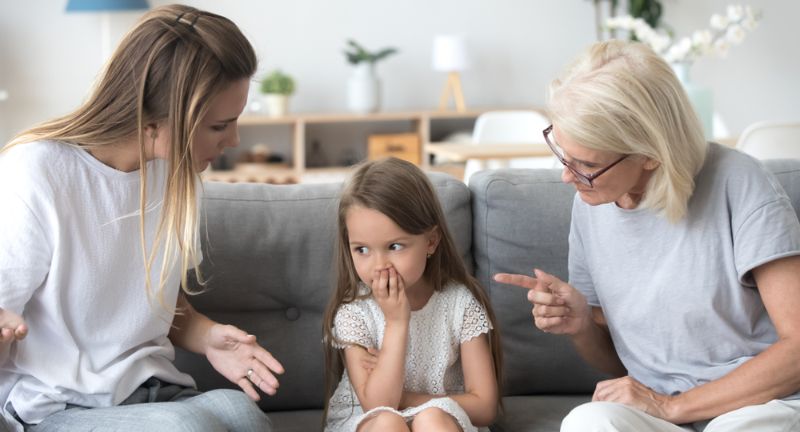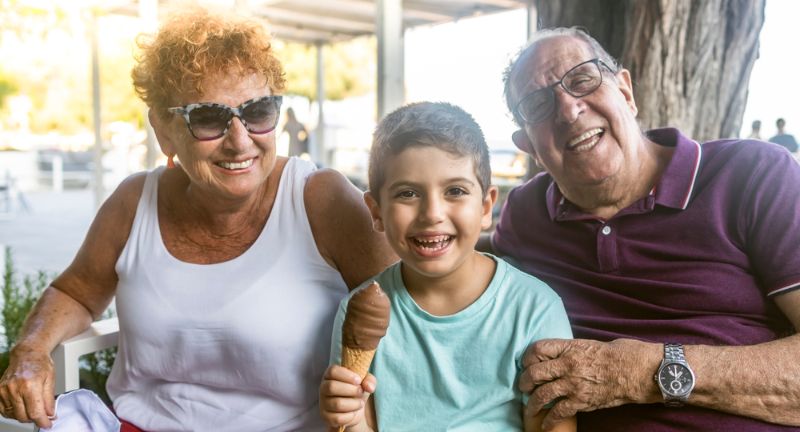LIFESTYLE
24 Surprising Mistakes Even the Best Grandparents Make
Published
2 months agoon

Shutterstock
Grandparents hold a special place in families, offering love, wisdom, and treasured memories. Yet, even the most well-intentioned grandparents can unintentionally make missteps that may cause family tension or misunderstandings. From small oversights to generational differences in parenting, these mistakes often happen without grandparents realizing their impact. By being mindful of these potential pitfalls, grandparents can enhance their relationships with both their children and grandchildren. Here’s a look at 24 common mistakes that grandparents should avoid to create a closer, happier family bond.
Overstepping Parenting Boundaries

Shutterstock
Many grandparents mean well, but offering unsolicited parenting advice can sometimes be seen as crossing a line. It can feel to parents like their methods are being questioned, creating a rift rather than support. Letting parents lead while gently offering guidance if asked helps to maintain trust and respect. Being mindful of boundaries keeps the relationship positive and strengthens the family bond.
Favoritism Among Grandchildren

Shutterstock
While it’s natural to connect with some grandchildren more than others, showing obvious favoritism can create jealousy and insecurity. Even small gestures, like more attention or praise for one child, can be noticed by siblings. Working to give equal attention, gifts, and praise helps all grandchildren feel equally valued. This balanced approach fosters a more united, loving family dynamic.
Undermining Parental Rules

Shutterstock
Ignoring or bending house rules set by parents—like bedtime or snack limits—can create confusion and tension. Kids may start to feel they don’t need to listen to their parents if grandparents often make exceptions. Instead, helping to reinforce these rules, even if it means fewer treats or earlier bedtimes, shows support for the parents. This cooperative effort strengthens family harmony and consistency for children.
Sharing Family Business

Shutterstock
Discussing adult issues, like family finances or conflicts, in front of children can cause confusion or worry. Kids often overhear more than we realize, and sensitive topics can lead to stress or anxiety. Keeping discussions private ensures that grandchildren aren’t burdened with adult worries. This separation lets children enjoy a safe, worry-free environment in the family.
Bribing for Affection

Shutterstock
Using toys, treats, or money to gain a grandchild’s love can have long-term consequences, making kids see relationships as transactional. Genuine connection comes from shared moments, not material things. Instead of gifts, focusing on storytelling, games, or shared hobbies can create a deeper bond. This approach helps kids cherish the time spent together more than any gift.
Comparing the Generations

Shutterstock
Comparing today’s parenting styles or attitudes to “how things were” can make parents feel criticized. It may seem like their challenges are being minimized, creating tension in family conversations. Embracing generational differences without judgment shows understanding and adaptability. This openness helps build respect and empathy across generations.
Forgetting They’re Grandparents, Not Parents

Shutterstock
Some grandparents find it hard to let go of parenting habits, but stepping back allows parents to lead. Trying to act as a second set of parents can create conflicts or mixed messages for kids. Embracing the unique, supportive role of a grandparent allows for a healthier dynamic. This new role lets grandparents build strong, special bonds with their grandchildren.
Not Respecting Boundaries on Visits

Shutterstock
Unexpected visits or extended stays can throw off routines and disrupt family time. Respecting boundaries by scheduling visits in advance shows thoughtfulness. It also allows parents and children to prepare for quality time with grandparents. Clear communication about visits promotes a harmonious family relationship.
Being Too Critical of Parenting Styles

Shutterstock
Offering critical feedback on parenting methods, especially in front of others, can create hurt feelings and division. Grandparents may have insights, but gentle encouragement is usually better received than criticism. Recognizing that parents know what works best for their children fosters mutual respect. Supportive advice shows trust in the parents’ decisions, creating a stronger family bond.
Trying to Relive Parenting with Grandchildren

Shutterstock
It can be tempting for grandparents to try to recreate their own parenting days with their grandchildren, but this can overstep boundaries. Allowing the children’s parents to guide their upbringing shows respect for their role. Instead, enjoying the freedom to be a “fun” grandparent, free from the daily responsibilities of parenting, can be fulfilling. This approach lets grandparents focus on fun and love without the stresses of discipline.
Overloading Grandchildren with Activities

Shutterstock
Planning multiple outings or events in one day can be overwhelming for young kids, leaving them exhausted and overstimulated. Grandchildren may enjoy simpler, more relaxed activities where they can set the pace. Instead of a packed agenda, consider quality over quantity, letting children lead the playtime or activities. This approach makes time together more enjoyable and memorable for everyone.
Excessive Gift-Giving

Shutterstock
Giving gifts frequently can lead grandchildren to value material items over relationships. When gifts are rare and meaningful, they hold greater sentimental value. Grandparents can show love in many ways, such as through shared stories or activities rather than physical items. This focus on experiences builds a deeper bond and lasting memories.
Setting Unrealistic Expectations for Visits

Shutterstock
Expecting grandchildren to spend every holiday or major event with grandparents may feel restrictive for parents who have other family obligations. Flexibility in planning allows families to balance commitments without guilt. When visits are flexible and considerate, families can enjoy time together without the stress of obligation. This understanding fosters a warm, inclusive family environment.
Insisting on Outdated Beliefs

Shutterstock
Holding onto traditional views can feel dismissive to younger generations who may see things differently. Being open to new ideas shows a willingness to understand and respect evolving perspectives. Sharing one’s own experiences without enforcing them helps maintain harmony. This openness creates a space where everyone feels valued and understood.
Criticizing the Parents in Front of Kids

Shutterstock
Making negative comments about parents in front of grandchildren can damage trust and create confusion. Kids are often very loyal to their parents and may feel uncomfortable or anxious about family conflicts. Instead, private conversations among adults keep children protected from sensitive topics. This approach reinforces a healthy, respectful family dynamic for everyone involved.
Ignoring Parental Dietary Restrictions

Shutterstock
Providing treats that go against family dietary guidelines can create health risks or cause upset. Respecting parental food rules, like limiting sweets or avoiding allergens, shows that grandparents are supportive and aligned with parents. Following these guidelines ensures that kids stay safe and healthy while visiting. It also reinforces a positive example of healthy eating habits.
Setting Their Own Rules at Home

Shutterstock
While it’s natural to have some flexibility, setting drastically different rules can confuse children and undermine parental authority. By respecting the family rules, even when at their own home, grandparents reinforce consistency. This approach shows that rules are meant to be followed everywhere, building understanding and trust. It also makes transitions between homes easier for children.
Not Keeping Up with Technology

Shutterstock
Technology is a major part of children’s lives today, and familiarity with it can help grandparents stay connected. Learning to text, video call, or play an online game allows for more engagement with grandkids. Embracing these tools fosters a relationship that fits into the digital world children are familiar with. It also shows a willingness to adapt, bridging generational gaps.
Focusing Only on Young Grandchildren

Shutterstock
As grandchildren grow, it’s important to continue nurturing the relationship and showing interest in their evolving lives. Even as teens or young adults, grandchildren value time spent with grandparents, but it may look different. Engaging in age-appropriate activities and conversations keeps the bond alive. Showing support at every age helps grandparents stay connected with each family member.
Playing “Good Cop” When Parents Are “Bad Cop”

Shutterstock
Always siding with grandchildren or bending the rules can create tension between parents and grandparents. Kids may exploit this dynamic, leading to frustration and disciplinary conflicts. Supporting the parents’ role in setting limits shows unity in the family. This cooperative approach strengthens both family trust and respect for boundaries.
Trying to “Fix” Every Problem

Shutterstock
While grandparents often want to solve problems for their family, it can interfere with parents’ authority or decision-making. Allowing parents to take the lead in resolving issues reinforces their role. Grandparents can offer gentle support without overstepping. This trust in parental decisions helps strengthen family independence and resilience.
Overwhelming with Nostalgia

Shutterstock
Reminiscing about “the good old days” can feel isolating to younger family members who may not relate. While sharing stories is valuable, it’s important to balance them with present-day topics of interest to grandkids. Creating new memories is as meaningful as sharing old ones. This approach helps to keep relationships fresh and relatable across generations.
Inconsistent Engagement

Shutterstock
Children thrive on consistency, and regular communication or visits with grandparents help to build a strong relationship. Sporadic interactions can make them feel overlooked or less valued. Checking in regularly, even with small gestures like a call or card, shows they’re an important part of the grandparents’ lives. This steady presence strengthens family connections and trust.
Forgetting to Prioritize Their Own Health

Shutterstock
Staying healthy ensures grandparents can keep up with the energy and demands of spending time with grandchildren. Neglecting self-care can lead to exhaustion or illness, limiting the time they can enjoy with family. Prioritizing wellness, from routine checkups to regular exercise, helps them be an active part of their grandchildren’s lives. This commitment to health benefits the entire family for years to come.
Conclusion

Shutterstock
Grandparents have an invaluable role in the lives of their grandchildren, offering wisdom, love, and a link to family history. By recognizing and avoiding these common, unintended mistakes, they can build even stronger bonds and enjoy fulfilling relationships with every generation. Small adjustments and open communication with parents help ensure family dynamics stay positive and supportive. Remember, it’s the love and presence that matter most to grandchildren, far more than any single moment or gift. With these insights, grandparents can continue to enrich their family’s lives with joy and cherished memories.
Related Topics:

More From Lifestylogy
-


20 Things People Mindlessly Spend Their Money On That Might…
-


30 Fruits And Vegetables That Have The Highest Nutrient Density
-


20 Vitamins That Make The Most Impact On Your Health
-


25 Tips For Attending A Golf Tournament Like The PGA…
-


25 Global Food Trends That Will Continue Into 2025
-


40 Timeless Classics You Need to Read Before You Die
-


28 Foods That Are Considered To Be Cold And Flu…
-


25 Exciting Ways to Beat Boredom in Retirement
-


28 Proven Ways to Boost Your Productivity Every Day